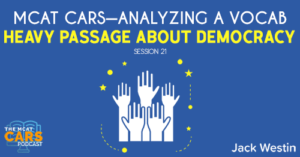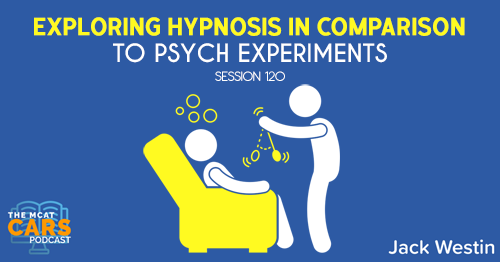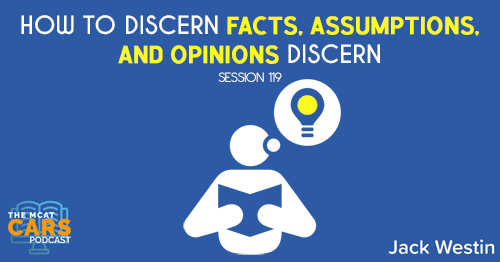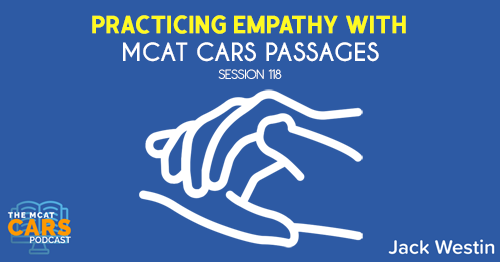Apple Podcasts | Google Podcasts

Session 21
Today, we’re delving into a passage about democracy. Pay close attention and try to find the paradox and the reasons democracy is being threatened using your MCAT CARS skills.
As always, I’m joined by Jack Westin from JackWestin.com – the premier MCAT CARS tutor online. If you want some more practice outside of these podcasts, click on the CARS daily passages. They’re providing you with free passages that are emailed to you every day. Jack Westin tries to mimic that to the best of their ability in every level. They look at the nature of the arguments and what they discuss in the passage. Doing this for nearly a decade has taught Jack exactly the arguments, the styles, what they prefer, what they’re looking for. They want to see if you can figure out the points of this passage while probably knowing nothing about this.
Link to article: https://www.theguardian.com/news/2018/oct/11/could-populism-actually-be-good-for-democracy
Everyone seems to agree that democracy is under attack. What is surprising is how many of its usual friends have come to fear democracy itself – or perhaps to fear that a country’s people, too inflamed by narrow passions, risk turning politics into a distasteful blood sport, pitting The People vs Democracy, in the startling words of one recent book title.
Observers have understandable qualms about political programmes that are alarmingly illiberal, yet obviously democratic, in that most citizens support them. In Poland and Hungary, democratically elected ruling parties attack Muslim migrants for undermining Christian identity. In the Philippines, President Rodrigo Duterte rules with an iron fist, pledging to put drug pushers in funeral parlours, not prisons.
Modern democracies all rest on a claim of popular sovereignty – the proposition that all legitimate governments grow out of the power of a people, and in some way are subject to its will. Yet when a large majority of a country’s people vehemently supports policies a critic finds abhorrent, many liberals, even avowed democrats, recoil in horror.
Thus arises the possibility of a painful paradox: that “democracies end when they are too democratic”. So concluded a 2016 piece by the US political observer Andrew Sullivan, resurrecting an argument made two generations earlier by Samuel Huntington (in a 1975 report called The Crisis of Democracy, issued in the wake of the international student revolts of the 1960s).
Even the leftwing scholar Chantal Mouffe, who has long championed raw populist conflict as the essence of “radical democracy”, seems distraught at current events. “Democracy that is in good working order – with conflict, but where people accept the existence of their adversaries – is not easy to re-establish,” she recently told an interviewer, gesturing implicitly toward tolerance, one of the most jeopardised liberal norms in the current context: “I’m not that optimistic.”
Current affairs may seem especially bleak, but fears about democracy are nothing new. At the zenith of direct democracy in ancient Athens, in the fifth century BC, one critic called it a “patent absurdity” – and so it seemed to most political experts from Aristotle to Edmund Burke, who considered democracy “the most shameless thing in the world”. As the American founding father John Adams warned, “there never was a democracy yet that did not commit suicide”.
[04:16] Paragraph 1, Sentence 1:
Everyone seems to agree that democracy is under attack.
Jack says:
The author is saying democracy is under attack and everyone apparently thinks that.
[04:29 Paragraph 1, Sentence 2:
What is surprising is how many of its usual friends have come to fear democracy itself – or perhaps to fear that a country’s people, too inflamed by narrow passions, risk turning politics into a distasteful blood sport, pitting The People vs Democracy, in the startling words of one recent book title.
Jack says:
The author is saying potentially that people who like democracy are now scared of it and kind of giving a reason why the people are scared and inflamed by their passions and turning it into this blood sport.
We’re not seeing democracy in terms of its glories, in terms of its success. We’re talking about it in terms of its failures, in terms of its problems, and knowing that can help you answer a lot of questions. By reading this paragraph, you have set the scene for what we’re going to probably discuss throughout the rest of this passage.
Democracy’s hurting in some way. There are some issues causing some kind of violence, we don’t really know exactly what, but that’s all we really know at this point.
[05:30] CARS Strategy: Should You Read the Questions First?
You read the questions first because then you’ll know what to look for. However, it’s very hard to keep track of what the questions were even asking if you don’t understand what’s being discussed. So it could be a very bad strategy to read the questions first and then answer questions.
You may be able to do that and pull that off for the sciences, but not for CARS. You just have to do what you’re normally supposed to do. Read the passage, answer the questions.
Just read and try your best to understand, and if you do that, you’re going to have a great time with the questions, or at least a better time than you would if you were to just read the questions first.
[06:50] Paragraph 2, Sentence 1:
Observers have understandable qualms about political programmes that are alarmingly illiberal, yet obviously democratic, in that most citizens support them.
Jack says:
It seems like there’s something illiberal, and people are supporting it democratically speaking. And the author says what democracy is – democratic in that most citizens support them.
Democratic, as we all probably already know, is about the opinions of people, the majority of people. That’s what democracy is all about. So the author’s defining democracy for us. It’s the support of the people.
And it seems like democracy is going against liberal ideas. It’s illiberal, right? It’s going against liberal ideas. I don’t know how that plays in, but that’s something the author is bringing up, so maybe we have to pay attention to that.
[08:10] Paragraph 2, Sentence 2:
In Poland and Hungary, democratically elected ruling parties attack Muslim migrants for undermining Christian identity.
Jack says:
Here, the author is giving an example of something that is democratic because we have ruling parties that were elected democratically, and they are illiberally attacking Muslim migrants for undermining Christian identity. They have educated you on this at this point. They have given you an example of this.
[08:45] Paragraph 2, Sentence 3:
In the Philippines, President Rodrigo Duterte rules with an iron fist, pledging to put drug pushers in funeral parlors, not prisons.
Jack says:
Again, another example of somebody who was elected president in the Philippines is violently dealing with things potentially that is not very fun. And you now know what illiberal means – Violent, maybe attacking in some ways, so we can probably think of liberals as more passive in this regard. There might be a different definition of liberal depending on who you are, but that’s the author’s interpretation of what illiberal means – attacking.
[09:36] Paragraph 3, Sentence 1:
Modern democracies all rest on a claim of popular sovereignty – the proposition that all legitimate governments grow out of the power of a people, and in some way are subject to its will.
Jack says:
Modern democracies are these governments that are voted in, elected in, the power of the people. A democracy is a government run by the majority of the people – what the majority of the people dictate. So whatever they dictate goes, and that’s their will. They’re subject to its will. So you’re subject to whatever people believe or agree with. Unless you have an electoral college, like the U.S., then it’s not the majority.
[10:55] Paragraph 3, Sentence 2:
Yet when a large majority of a country’s people vehemently supports policies a critic finds abhorrent, many liberals, even avowed democrats, recoil in horror.
Jack says:
It’s a paradox. It’s a dilemma. Democrats, liberals, they like freedom of speech, they like freedom of voting, and doing what you want. But what if that voting revolves around illiberal ideas?
So the first sentence of this paragraph is defining what democracy is. It’s the will of the people. It’s what people decide. But what if the will of the people is going against liberal ideas?
Think of this like people who are doing things that are not necessarily going with what liberals like. Violence, for instance. This goes back to the idea in the second paragraph too.
This is the hard part about this passage. You have to know that there is a distinction between democracy and liberalism. Liberal ideology and democracy are separate entities, and the author is making that very clear, that sometimes there is this dilemma, there’s this problem between liberalism and just democracy in general.
Usually, what we like to do is we think of liberals as democracy, but sometimes there is this issue, this issue where democracy could go against liberal ideas.
[12:59] Paragraph 4, Sentence 1:
Thus arises the possibility of a painful paradox: that “democracies end when they are too democratic”.
Jack says:
If it’s too democratic, it becomes violent. And it’s violent because it’s not liberal anymore, it’s illiberal. So maybe if it’s too democratic, it becomes illiberal, which means that it ends for some degree. That’s what the author is trying to say at least. It’s a lot going on and it’s very hard to understand. But as long as you know that we’re discussing democracy and how it can lead to some kind of violence that’s illiberal, you’re good.
[13:49] Paragraph 4, Sentence 2:
So concluded a 2016 piece by the US political observer Andrew Sullivan, resurrecting an argument made two generations earlier by Samuel Huntington (in a 1975 report called The Crisis of Democracy, issued in the wake of the international student revolts of the 1960s).
Jack says:
The second part of that is just kind of the author saying, “Look, somebody else thinks this too.”
[14:22] Paragraph 5, Sentence 1:
Even the leftwing scholar Chantal Mouffe, who has long championed raw populist conflict as the essence of “radical democracy”, seems distraught at current events.
Jack says:
The left wing could mean liberal for all we know.
[14:51] Paragraph 5, Sentence 2:
“Democracy that is in good working order – with conflict, but where people accept the existence of their adversaries – is not easy to re-establish,” she recently told an interviewer, gesturing implicitly toward tolerance, one of the most jeopardized liberal norms in the current context: “I’m not that optimistic.”
Jack says:
So it looks like this woman here, Chantal is saying, “Look one of the norms that we’re missing is tolerance, and that’s part of the issue with what we have.” It’s interesting because the author, or Chantal in this case, is saying that democracy that accepts both positions is hard to re-establish, meaning that maybe we lose this to some degree when we’re too democratic.
And Chantal is obviously trying to say that that’s a good thing. It’s good to have this debate, but when we lose it, that’s bad, it’s hard to re-establish. So that’s probably the issue that Chantal is having, and that is really the idea of tolerance – tolerating other people’s points of views.
And that may be something that has jeopardized, something that you lose because of this two democratic nature of what’s going on.
So the author has decided that the word tolerance means acceptance of points of views, and that acceptance is being taken advantage of when we’re too democratic. It even says it’s one of the most jeopardized liberal norms. So it defines it as a liberal idea.
Tolerance is a liberal idea. Not being violent is a liberal idea. So those are the things that are being jeopardized or being weakened as a result of a democracy.
[17:15] Paragraph 6, Sentence 1:
Current affairs may seem especially bleak, but fears about democracy are nothing new.
Jack says:
So the author is pointing out, kind of similar to last week’s or two weeks ago, that look, “We have this thing that everybody is scared of, but it’s not new, it’s been around.”
[17:35] Paragraph 6, Sentence 2:
At the zenith of direct democracy in ancient Athens, in the fifth century BC, one critic called it a “patent absurdity” – and so it seemed to most political experts from Aristotle to Edmund Burke, who considered democracy “the most shameless thing in the world”.
Jack says:
We have some names here, Aristotle and Edmund Burke, and calling democracy the most shameful thing in the world. So just some examples of how we’ve had fears and critics of democracy for a while.
[08:13] Paragraph 6, Sentence 3:
As the American founding father John Adams warned, “there never was a democracy yet that did not commit suicide”.
Jack says:
John Adams is warning us. So even the person who founded America was concerned about democracy, yet we still created it. So there’s always been concerns – even back to the initial stages of democracy in America. The author is trying to imply that, “Look, we’re always going to be worried about democracy.” And this is where the author is really painting the picture that maybe it’s not that big of a deal.
Maybe democracy is challenging liberal norms, maybe it’s going to be too violent, or not being tolerant enough, but that doesn’t mean necessarily that democracy will end. That’s too extreme. At least that’s what the author is saying, especially when the author directly said that it’s kind of absurd.
[20:00] Takeaway from the Passage:
Alright, so big takeaway from this is that democracy is under attack. And democracy kind of has always been under attack. Democracy is under attack in terms of liberal norms. It’s going against liberal ideas, but that doesn’t necessarily mean it’s going to end democracy. It’s always been under attack.
[20:22] Jack Westin
Check out JackWestin.com. If you want some more help, some more prep outside of these podcasts which come out every week, you can get a passage – a CARS passage – sent directly to your inbox every single day.
Links:
SEARCH SITE
SEARCH SITE
LISTEN FOR FREE











